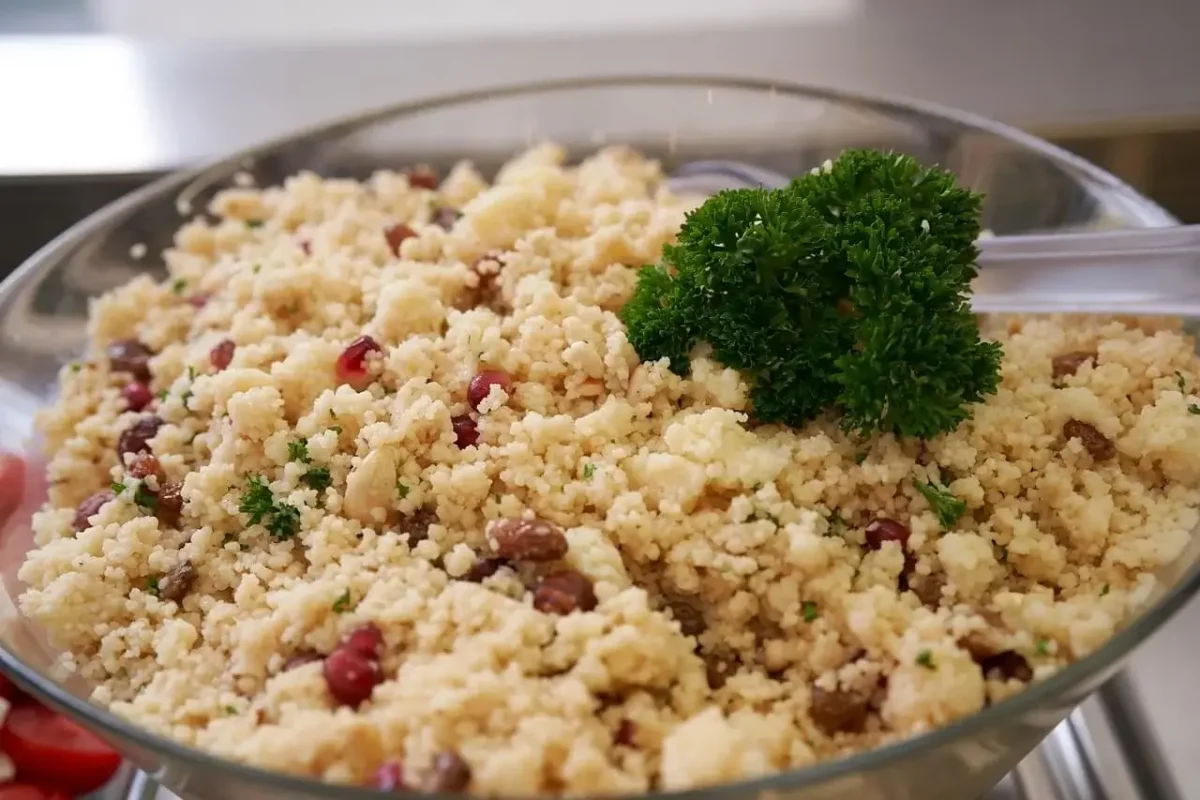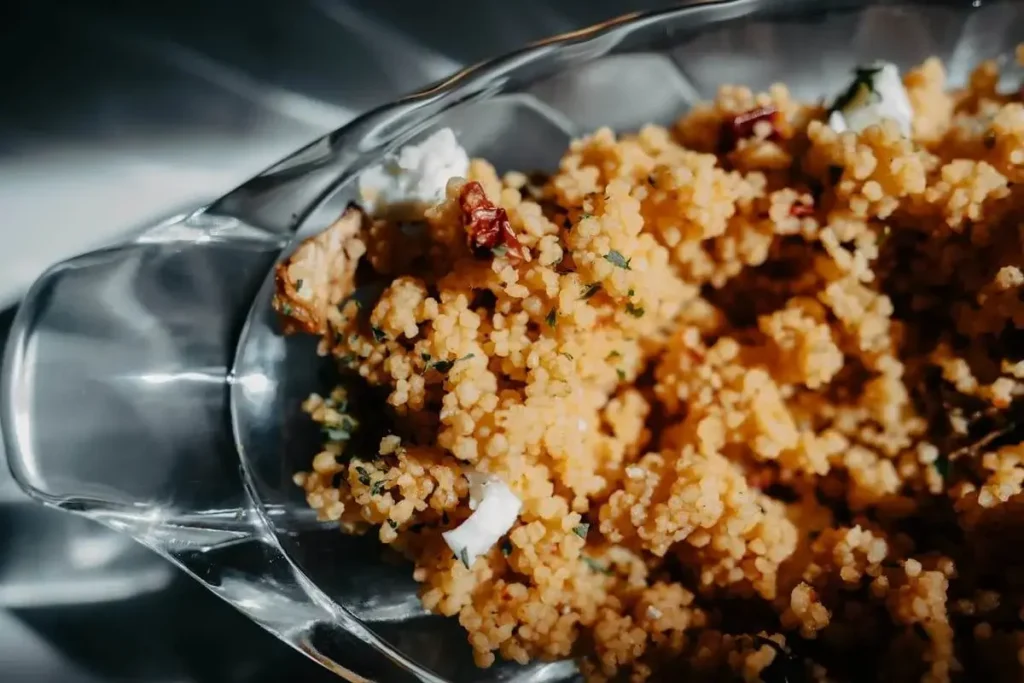Couscous, a staple of North African cuisine, has won hearts worldwide with its versatility and ease of preparation. But when it comes to storing couscous long-term, particularly by freezing, many wonder if it’s feasible without compromising its delightful texture and flavor. In this article, we’ll dive deep into whether you can freeze couscous, offer a step-by-step guide on how to do it, and provide you with some ingenious ways to use frozen couscous in your meals. So, let’s get started and unravel the secrets of preserving couscous for longer freshness!
Overview of Couscous
What is Couscous?
Couscous isn’t your ordinary grain; rather, it’s a type of pasta made from tiny granules of durum wheat semolina. Originating from the Maghreb, couscous has become a beloved side dish around the globe. It often finds its place alongside vegetables and meats or serves as a substitute for rice in various dishes.
Couscous is celebrated for its incredible adaptability in the kitchen. It acts as a blank canvas, allowing culinary enthusiasts to paint with a palette of flavors, from the comforting and traditional to the boldly innovative. Whether you’re whipping up a quick weeknight dinner or preparing a sumptuous feast, couscous can elevate your cooking with its subtle, nutty flavor and light, fluffy texture.
Popularity and Uses in Cuisine
The popularity of couscous is undeniable. Moreover, its preparation is straightforward and quick, often requiring just a simple steaming or a brief soak in hot water. This simplicity has made it a favored choice in fast-paced kitchens and among those who cherish time-saving yet nutritious meal options.
Moreover, couscous is a fantastic source of carbohydrates and fiber, while also being low in fat. This combination makes it a nutritious component of any meal, contributing to a feeling of fullness without the heaviness associated with other starches.
In the next section, we’ll explore the crux of the matter: can you freeze couscous? Stay tuned as we delve into this topic, providing you with all the info you need to make the most out of your couscous stash!
Can You Freeze Couscous?
Freezing Cooked and Uncooked Couscous
So, can you freeze couscous? The answer is a resounding “Yes!” Freezing cooked or uncooked couscous is a great way to prolong its shelf life. Freezing doesn’t just keep it edible; it retains the quality remarkably well, making it just as delightful when thawed.
How to Freeze Cooked Couscous
Freezing cooked couscous is straightforward but requires a bit of care to ensure the best results upon thawing. Here’s what you should do:
- Cool It Down: First things first, let your cooked couscous cool to room temperature. Hastening the cooling process by spreading it out on a baking sheet can prevent any unwanted condensation or sogginess.
- Separate Other Ingredients: If your couscous was part of a mixed dish with vegetables or meats, separate them before freezing. This step is crucial as it helps maintain the optimal texture and flavor of the couscous when reheated.
- Spread for Freezing: Once cool, spread the couscous evenly on a tray or baking sheet. The trick here is to prevent clumping, ensuring each grain remains distinct.
- Wrap and Freeze Couscous: Cover the tray with plastic wrap or a reusable food cover. Then, place it in the freezer. Once the couscous is frozen solid, transfer it to a freezer-safe bag or container. This method prevents freezer burn and keeps your couscous fresh for three to four months.
Tips to Freeze Dried Couscous
Uncooked couscous is even easier to manage:
- Ensure the couscous is in airtight packaging or a sealed container. This keeps out moisture and odors from other foods in your freezer.
- Store it in a cool, dry section of your freezer to maintain its quality.
Both methods are straightforward ways to preserve your couscous, ensuring you always have some on hand for a quick meal.
In the next segment, we’ll look at the benefits of freezing couscous, not just from a convenience standpoint but also how it can help maintain its quality over time. Stay tuned for more insightful tips on making the most of your freezer space!
Can You Freeze Couscous: Exploring Its Benefits
Quality of Preserving Couscous
Freezing couscous isn’t just about stashing it away for a rainy day; it’s about preserving its delightful texture and flavor. When properly frozen, couscous can maintain its quality for three to four months. This makes it an excellent option for meal preppers and those who like to have healthy, quick options on hand.
Texture and Taste Considerations
One of the most significant benefits of freezing couscous is the ability to maintain its texture. Unlike other grains that might become mushy or dry out when frozen, couscous retains its fluffy, light characteristics if frozen correctly. This means that when you’re ready to enjoy it, it’s almost as if you’ve just prepared it fresh.
Moreover, the taste of couscous remains intact. Freezing locks in the freshness, preventing the stale, bland flavors often associated with long-stored grains. This is especially important for couscous, which is best enjoyed when it can absorb and complement the flavors of your other dish ingredients.
Duration for Which Couscous Can Remain Frozen Without Losing Quality
Couscous stored in the freezer remains at its best for about three to four months. Beyond this period, while still safe to eat, it may start to lose some of its textural qualities and flavor potency. Therefore, it’s a good practice to label your frozen couscous with the date of freezing, ensuring you use it within its optimal quality window.
The ability to freeze and thus extend the shelf life of couscous not only helps in reducing food waste but also ensures that you have a nutritious and versatile ingredient ready whenever you need it. This aspect of convenience paired with quality preservation makes freezing a smart choice for managing your kitchen more effectively.
In the following section, we’ll delve into the process of thawing and reusing frozen couscous. This will ensure that you make the most out of every grain, with handy tips on reheating it to perfection. Stay tuned as we further explore the practical and delicious world of couscous!
Thawing and Reusing Frozen Couscous
How to Thaw Frozen Couscous
Thawing couscous is as important as freezing it correctly to preserve its best qualities. Here’s how to ensure that your frozen couscous returns to its near-original state:
- Refrigerator Thawing: The best method for thawing couscous is in the refrigerator. Simply transfer the frozen couscous from the freezer to the fridge and let it thaw overnight. This slow thawing process helps maintain the couscous’s texture and prevents it from becoming soggy.
- Room Temperature Thawing: If you’re in a hurry, you can thaw couscous at room temperature. Spread it out on a plate to allow even air circulation around the grains, reducing the risk of them clumping together. This method usually takes a few hours, depending on the quantity.
Reheating Tips
Once thawed, reheating couscous properly is crucial to enjoying its best texture and flavor:
- Steaming: Steaming is the most effective way to reheat couscous. It reintroduces moisture gently, fluffing up the grains without making them mushy. You can use a conventional steamer or a colander over a pot of boiling water.
- Microwave Reheating: For a quicker option, you can microwave thawed couscous. Place it in a microwave-safe dish, sprinkle some water over it to add moisture, and cover. Microwave on high for 1-2 minutes, pausing to stir halfway for even heating.
- On the Stove: You can also reheat couscous in a skillet. Add a little water or broth to prevent it from drying out, and stir gently over medium heat until it’s warmed through.
Employing these methods ensures that your couscous remains fluffy and delicious, almost as if it were freshly made. Plus, it’s a quick way to add a wholesome component to your meals, whether you’re incorporating it into a new recipe or enjoying it as a simple side dish.
In the next part, we’ll get creative with some delightful recipes that make the most of your frozen couscous, proving that good cooking doesn’t always require fresh ingredients but just a bit of ingenuity!
Creative Recipes Using Frozen Couscous
Recipe Ideas
Having frozen couscous at your disposal opens up a plethora of culinary possibilities. Here are a few creative ways to use it in your cooking:
- Couscous Salad with Roasted Vegetables: Thaw your couscous and toss it with a medley of roasted vegetables like bell peppers, zucchini, and cherry tomatoes. Add a drizzle of olive oil, lemon juice, and your favorite herbs for a refreshing and nutritious salad.
- Stuffed Peppers with Couscous and Feta: Mix thawed couscous with crumbled feta, chopped olives, and fresh parsley. Use this mixture to stuff bell peppers, then bake until the peppers are tender. This dish not only looks attractive but also bursts with flavorful goodness.
- Couscous Breakfast Bowls: Start your day with a hearty couscous breakfast bowl. Warm the thawed couscous and top it with a poached egg, sautéed spinach, and a sprinkle of paprika for a savory morning meal.
- Mediterranean Couscous Soup: Use thawed couscous as a base for a hearty Mediterranean-inspired soup. Add it to a broth loaded with tomatoes, chickpeas, and a mix of Mediterranean spices. It’s a warm, comforting dish perfect for chilly days.
- Dessert Couscous with Honey and Nuts: For a sweet treat, reheat couscous with a bit of milk or cream, then mix in honey, cinnamon, and chopped nuts. Serve warm for a delicious, comforting dessert.
Incorporating Frozen Couscous into Meals
Frozen couscous is not just a convenient ingredient; rather, it’s a versatile base that can be incorporated into numerous dishes. By utilizing it as a foundational element, you can enhance meals with added bulk, texture, and nutrition without compromising on taste or quality. Whether you’re looking to whip up a quick dinner or prepare an elaborate meal, frozen couscous can significantly cut down on prep time and enhance your dishes.
In the next section, we’ll answer some common questions about freezing and using couscous, helping clear any doubts and making your kitchen experiments even more successful.
Integrating Frozen Couscous into World Cuisines
Couscous, with its mild flavor and adaptable nature, finds a home in a variety of global cuisines. Here’s how you can use frozen couscous to bring international flavors to your table:
Middle Eastern Delights
- Tabbouleh: Replace traditional bulgur with couscous for a twist on this classic Middle Eastern salad. Mix thawed couscous with chopped parsley, mint, tomatoes, and a dressing of olive oil and lemon juice for a refreshing side dish.
- Couscous Pilaf: Enhance your pilaf by adding frozen couscous to sautéed onions, carrots, and spices like cumin and coriander. This dish pairs wonderfully with grilled meats or roasted vegetables.
Mediterranean Fusion
- Greek Couscous Salad: Thawed couscous can be the base for a vibrant Greek salad. Combine it with cucumbers, olives, feta cheese, and a splash of red wine vinegar for a quick and easy meal.
- Italian Couscous Risotto: Use couscous instead of Arborio rice to make a quick “risotto.” Cook it with vegetable broth, Parmesan cheese, and a touch of cream for a decadent, comforting dish.
North African Traditions
- Moroccan Couscous with Lamb: Simmer thawed couscous with a stew of lamb, raisins, almonds, and a robust blend of Moroccan spices like cinnamon and turmeric for a hearty and exotic meal.
- Tunisian Couscous with Harissa and Vegetables: Spice up your couscous with harissa, adding roasted vegetables and chickpeas for a complete, flavorful dish.
Utilizing Couscous in Asian Cuisines
- Couscous Fried Rice: Swap rice with couscous in this Asian-inspired dish. Stir-fry thawed couscous with eggs, peas, carrots, and soy sauce for a unique take on fried rice.
- Indian Couscous Curry: Incorporate couscous into curries as a substitute for rice. Its texture soaks up the rich sauces and spices, making it an excellent carrier for the intense flavors of Indian cuisine.
Through these diverse recipes, frozen couscous becomes a versatile star, adapting to various culinary traditions and enhancing the global dining experience. By integrating couscous into dishes from around the world, you not only broaden your culinary repertoire but also bring a touch of international flair to your everyday meals.
By exploring these recipes and tips, you’ve now unlocked the full potential of frozen couscous. Whether you’re meal prepping for the week or looking for quick, nutritious options, couscous is a fantastic choice to enrich your diet without spending hours in the kitchen. Enjoy the simplicity, versatility, and delicious possibilities that couscous brings to your table!
Frequently Asked Questions
In this section, we’ll address some of the most pressing questions about managing couscous in your kitchen, from reheating techniques to preservation tips.
-
How do you reheat frozen couscous?
Reheating frozen couscous is simple and can be done effectively to retain its best qualities. For the best results, steam it over boiling water for a few minutes until it’s thoroughly warmed. This method helps maintain its fluffy texture. On the other hand, you can opt to microwave it by placing the couscous in a microwave-safe dish, sprinkling a little water over the top, and covering it. Heat on high for 1-2 minutes, stirring halfway through to ensure even warmth.
-
How long does couscous last in the fridge?
Cooked couscous is safe to store in the refrigerator for 3 to 5 days when kept in an airtight container. This prevents it from absorbing odors and moisture from other foods in the fridge, ensuring it remains fresh and tasty.
-
Can you save leftover couscous?
Absolutely! Leftover couscous can be saved by cooling it down quickly at room temperature and then transferring it to an airtight container before refrigerating. Remember, if you’re planning to store it for more than a few days, freezing is a better option to maintain its quality.
-
How do you preserve couscous?
Preserving couscous effectively involves either refrigerating or freezing it. For refrigeration, ensure it’s stored in airtight containers to retain freshness and prevent contamination. To freeze couscous, spread it on a baking sheet to cool completely and prevent clumps, then store it in freezer-safe bags or containers. This method preserves it for up to four months, making it a convenient option for future meals.
By addressing these common questions, our aim is to assist you in maximizing the potential of your couscous. Consequently, it remains a versatile and enjoyable part of your meals. With these tips at your disposal, couscous can seamlessly integrate into your diet, providing nutritious and delicious options for any day of the week.



